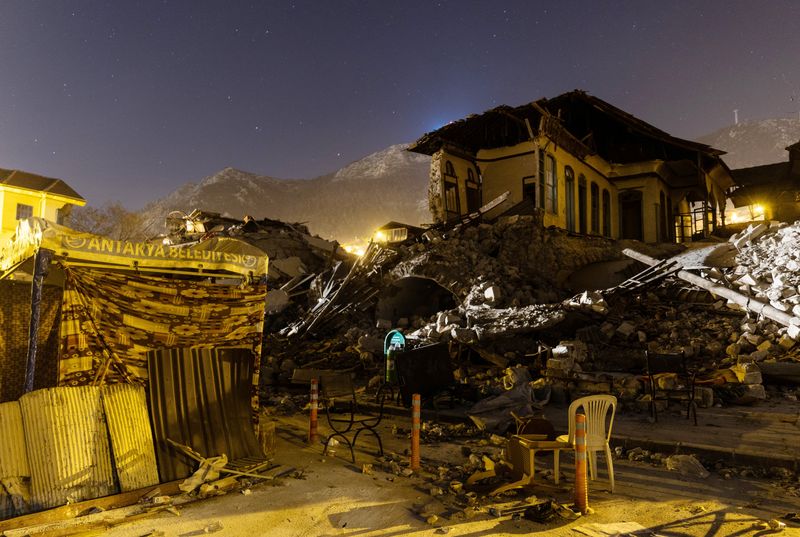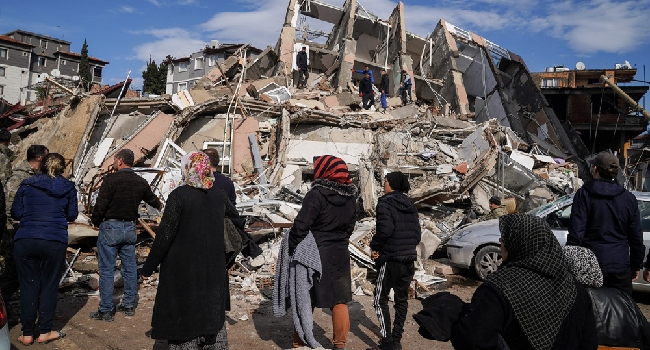Two weeks after a tremendous quake that killed over 47,000 people and damaged or destroyed hundreds of thousands of homes, CNN Turk reported on Tuesday that six people had died in an earthquake that hit the border region between Turkey and Syria.
The 6.4-magnitude earthquake that struck on Monday was close to the southern Turkish city of Antakya and felt across Syria, Egypt, and Lebanon. The European Mediterranean Seismological Centre reported that it occurred at a depth of 10 km (6.2 miles).
A rescue squad was trying to ascend to a ladder in a building where several people were during the most recent earthquake.

Did you read this?
According to Turkish Health Minister Fahrettin Koca, 294 individuals were affected during the quake on Monday evening, with 18 receiving critical injuries and are in hospitals at Adana and Dortyol.
After the severe tremors two weeks ago, some hospitals that had continued to operate had to evacuate their patients because cracks had appeared in the structures, according to Koca.
Residents in Samandag said other houses fell but most of the town had already fled following the initial tremors, according to the country's Disaster and Emergency Management Authority AFAD, which had recorded one death there on Monday. The streets were dark and deserted, surrounded by piles of debris and furniture.
Muna Al Omar said that as the ground began to tremble again, she was in a tent in a park in the heart of Antakya.
She sobbed as she cradled her 7-year-old kid in her arms on Monday, "I thought the world was going to crack up under my feet."

As rescue efforts following the earthquake and its aftershocks on February 6 dwindled and attention shifted to shelter and restoration work, U.S. Secretary of State Antony Blinken said on a visit to Turkey on Monday that Washington will assist "for as long as it takes."
The number of deaths from the earthquakes two weeks ago in Turkey increased to 41,156, according to AFAD on Monday. With 385,000 apartments reported to have been significantly damaged or destroyed. Many people are still missing so the death toll is expected to rise.
According to President Tayyip Erdogan, construction on roughly 200,000 apartments in 11 earthquake-stricken areas of Turkey will start next month.
According to the U.S. State Department, $185 million has been allocated in total by the United States for humanitarian relief to support the earthquake response in Turkey and Syria.
According to the U.N. Office for sexual and reproductive health, roughly 356,000 pregnant survivors of the earthquakes urgently require access to medical care.
These include 130,000 women in Syria and 226,000 in Turkey, with at least 38,800 of them due to give birth in the coming month. Many still fight for food and clean water while living in camps or outside in the harsh cold.

Most casualties are in Syria, a country already dealing with more than ten years of civil war; according to the U.N., 4,525 people are dead. Aid attempts are not easy since insurgents in the region conflict with soldiers loyal to President Bashar al-Assad.
According to Syrian sources, 1,414 individuals died in regions under Assad's control.
Medecins Sans Frontieres (MSF), a medical assistance organization, reported that a convoy of 14 of their trucks entered northwest Syria from Turkey on Sunday to help with rescue efforts.
The World Food Programme has also put pressure on those governments to stop preventing aid from reaching areas under the authority of the Syrian government.
A representative for the U.N. Office for the Coordination of Humanitarian Affairs reported that as of Monday morning, 197 vehicles carrying U.N. humanitarian aid had crossed into northwest Syria through two border crossings.
Several Syrian refugees in Turkey have returned to their homes in northwest Syria to contact family members impacted by the destruction.
On Monday morning, hundreds of Syrians waited in line to cross the border at the Turkish Cilvegozu gate.
About 350 people were waiting, according to Mustafa Hannan, who dropped off his pregnant wife and 3-year-old son.
After his Antakya home fell, the 27-year-old car electrician said his family was going for a few months, taking advantage of a promise by authorities to let them spend up to six months in Syria without losing the chance to return to Turkey.
He said, "I'm scared they won't be permitted back." "Our country has already been cut off from us. Are our families going to be split apart now too? My life will be wasted if I rebuild here and they are unable to come back."

-1676963105.jpeg)







